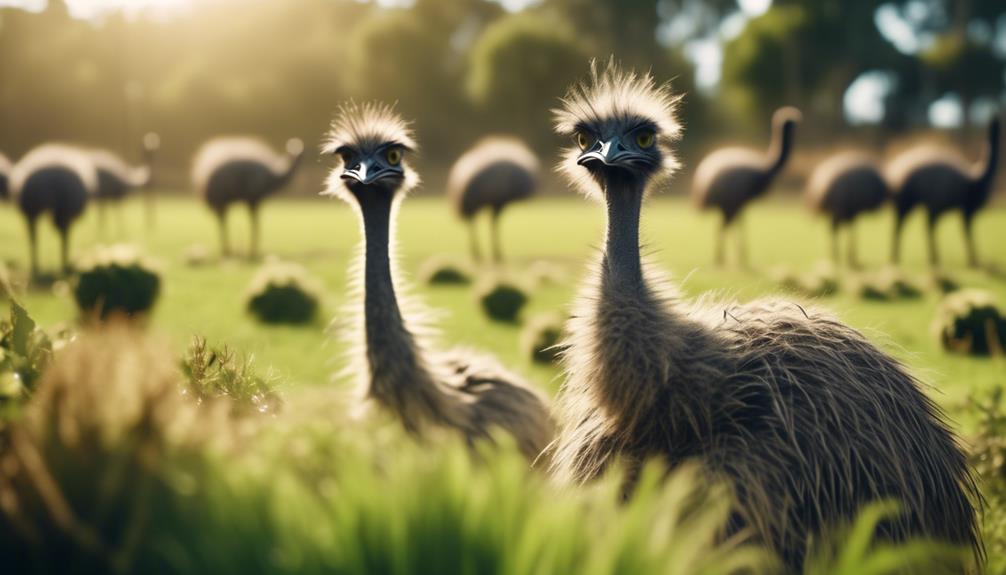
Imagine walking through a lush, green field, the sun casting a warm glow on the rolling landscape. In the distance, you spot a group of majestic emus gracefully moving through the grass, their feathers shimmering in the light.
But these remarkable creatures offer more than just a beautiful sight; they hold the potential to revolutionize sustainable agriculture. As you delve into the world of emu farming, you will discover the numerous opportunities and challenges that come with harnessing the power of these remarkable birds.
From their ecological benefits to the wide range of market opportunities, the possibilities are endless. Join us as we explore the untapped potential of emus in sustainable agriculture.
Advantages of Emu Farming

Emu farming offers numerous advantages for sustainable agriculture, making it a viable option for farmers seeking economic and environmental benefits.
One of the major advantages of emu farming is that emus are highly adaptable animals that can thrive in various climates and terrains. This means that emu farms can be established in a wide range of locations, providing opportunities for farmers in different regions to engage in this industry.
Another advantage of emu farming is the low maintenance required for these birds. Emus have a simple diet consisting of grass, seeds, and fruits, which makes feeding them relatively easy and cost-effective. Additionally, emus have a natural resistance to diseases and parasites, reducing the need for expensive medications and veterinary interventions.
Emus also offer several economic opportunities for farmers. Their meat is lean, high in protein, and low in fat, making it a healthy alternative to traditional livestock. Emu eggs are highly sought after for their unique green color and large size, which can be sold at premium prices. Emu oil, derived from their fat, has various uses in cosmetics and pharmaceuticals, providing additional income streams for farmers.
Ecological Benefits of Emu Agriculture
One of the ecological benefits of incorporating emu farming into sustainable agriculture is the positive impact it can have on soil health and nutrient cycling. Emus are known for their unique feeding habits, which involve scratching the soil surface with their powerful feet. This behavior helps to break up compacted soil, improving its structure and allowing for better water infiltration and root growth.
Additionally, as emus consume a variety of plants and insects, their waste contains a diverse range of nutrients that can be returned to the soil through their droppings. This natural fertilization process enhances soil fertility and reduces the need for synthetic fertilizers, thereby minimizing the environmental impact associated with their production and application.
Furthermore, emus have a low ecological footprint as they require minimal water and land resources compared to traditional livestock. Their grazing and browsing activities also promote biodiversity by creating diverse habitats for other species.
Emus as a Low-Maintenance Livestock Option

As you explore the benefits of incorporating emu farming into sustainable agriculture, an additional advantage to consider is their suitability as a low-maintenance livestock option. Emus are known for their ability to thrive in various climates and environments, requiring minimal attention and resources. Here are three reasons why emus are a cost-effective option for low-maintenance farming:
- Minimal feeding requirements: Emus have a unique digestive system that allows them to efficiently convert food into energy. They can survive on a diet of grass, grains, and insects, reducing the need for expensive feed supplements.
- Self-sufficiency: Emus are independent animals that require little intervention from farmers. They're capable of finding their own food, making them less reliant on human assistance for sustenance.
- Resilience to disease: Emus have a strong immune system, making them less susceptible to common livestock diseases. This reduces the need for frequent veterinary visits and expensive medications.
Emus' low-maintenance nature not only saves time and effort but also reduces the overall cost of farming. With their ability to thrive in diverse conditions and their self-sufficiency, emus offer a sustainable and cost-effective livestock option for farmers looking to minimize their workload and expenses.
Emus' Adaptability to Various Climates
With their remarkable adaptability, emus can thrive in a wide range of climates, making them a versatile livestock option for sustainable agriculture. Emus are native to Australia, a country known for its diverse climate. They've evolved to withstand extreme temperatures, ranging from scorching heat to freezing cold.
Emus' ability to adapt to different climates is partly due to their unique reproductive habits. Unlike many other birds, emus don't build nests. Instead, they lay their eggs directly on the ground, allowing them to choose the most suitable spot based on the prevailing climate conditions. This flexibility enables emus to breed and raise their young successfully, regardless of the climate they inhabit.
Furthermore, emus have developed a robust immune system, which contributes to their resistance to diseases. Their strong defenses help them fend off various pathogens and parasites, making them less susceptible to illness compared to other livestock species. This resilience reduces the need for medical interventions, ultimately promoting sustainable farming practices.
Emus' adaptability to various climates, combined with their reproductive habits and disease resistance, make them a reliable choice for farmers seeking sustainable livestock options.
Potential Market Opportunities for Emu Products

Emus' adaptability to various climates not only makes them a reliable choice for sustainable agriculture but also opens up potential market opportunities for their products. As consumer demand for sustainable and ethically sourced products continues to rise, emu products are gaining traction in the market.
Here are some potential market opportunities for emu products:
- Emu oil: Emu oil is known for its numerous health benefits and is in high demand in the cosmetic and pharmaceutical industries. Its anti-inflammatory properties make it a sought-after ingredient for skincare products and pain relief remedies.
- Emu meat: Emu meat, with its low fat content and high protein levels, appeals to health-conscious consumers. It's a popular choice for those looking for alternatives to traditional meats like chicken and beef. Emu meat is also favored by the fitness community due to its lean and nutrient-rich composition.
- Emu feathers: Emu feathers are used in various industries, including fashion, crafts, and fly tying for fishing. Their durability and unique appearance make them desirable for creating fashionable accessories such as hats, boas, and earrings.
With increasing market potential and consumer demand, emu products offer a viable pathway for sustainable agriculture. Emus' adaptability and the versatility of their products make them a valuable asset in meeting the evolving needs of conscious consumers.
Challenges in Emu Farming: Limited Market Demand
Limited market demand poses challenges for emu farming. While emus offer various products like meat, oil, leather, and feathers, the market demand for these products is currently limited. This can make it difficult for emu farmers to sell their products and generate a consistent income.
One of the main reasons for the limited market demand is the lack of awareness and familiarity among consumers regarding emu products. Many people aren't aware of the nutritional benefits of emu meat or the various uses of emu oil, which hampers the demand for these products.
Another challenge faced by emu farmers is the high initial investment costs. Setting up an emu farm requires significant capital investment for infrastructure, fencing, breeding stock, and specialized knowledge. The limited market demand makes it harder for farmers to recover these costs and achieve profitability.
To overcome these challenges, emu farmers can focus on educating consumers about the benefits of emu products. This can be done through marketing initiatives, collaborations with local restaurants and retailers, and participation in food and trade fairs. By raising awareness and promoting the unique qualities of emu products, farmers can increase market demand and create a sustainable market for their products.
In addition, emu farmers can explore diversifying their product range to cater to niche markets. For example, they can develop value-added products like emu-based skincare or wellness products, targeting consumers interested in natural and sustainable alternatives.
While limited market demand is a challenge for emu farming, with strategic marketing efforts and diversification, emu farmers can overcome these obstacles and create a thriving market for their products.
Overcoming the High Initial Investment Costs

To successfully navigate the challenges of emu farming, it's essential to find effective strategies for overcoming the high initial investment costs. Emu farming can be a lucrative venture, but the upfront expenses can be daunting. Here are some strategies to help you overcome these financial barriers and find alternative funding options:
- Seek government grants and subsidies: Many governments offer financial assistance programs for farmers. Research and apply for grants or subsidies specifically designed for sustainable agriculture or livestock farming.
- Partner with investors or lenders: Look for potential investors or lenders who are interested in sustainable agriculture ventures. Present a well-researched business plan that highlights the potential profitability of emu farming and the steps you'll take to mitigate risks.
- Consider crowdfunding: Crowdfunding platforms can be a great way to raise funds for your emu farming project. Create a compelling campaign that emphasizes the sustainability and profitability of your venture to attract potential backers.
- Explore cooperative farming models: Collaborate with other farmers in your community to pool resources and share costs. This can help reduce the burden of initial investment and create a supportive network of like-minded individuals.
Specialized Knowledge and Skills Required for Emu Farming
Developing the necessary expertise and acquiring specialized skills is vital for successful emu farming. As an aspiring emu farmer, you need to possess a certain level of knowledge and proficiency to ensure the well-being and profitability of your emu business. Here are some key areas that require your attention:
| Required Expertise | Training and Qualifications | Financial Considerations |
|---|---|---|
| Understanding emu behavior and biology | Attending workshops and seminars on emu farming | Estimating startup costs accurately |
| Knowledge of emu nutrition and diet | Participating in hands-on training programs | Creating a comprehensive budget plan |
| Awareness of common diseases and health management | Obtaining certifications in animal husbandry | Identifying potential sources of funding |
| Familiarity with emu breeding and genetics | Seeking mentorship from experienced emu farmers | Evaluating the return on investment |
| Proficiency in emu handling and facility design | Joining emu farming associations | Developing a sound marketing strategy |
In addition to the required expertise and training, it is essential to conduct a profitability analysis to assess the financial viability of emu farming. This analysis should consider factors such as market demand, product pricing, and operational costs. By thoroughly understanding the financial aspects, you can make informed decisions and optimize your chances of success in the emu industry.
Emus' Role in Sustainable Land Management

Having established the necessary expertise and specialized skills in emu farming, it's important to explore the significant role that emus play in sustainable land management. Emus have a unique ability to contribute to erosion prevention, making them valuable assets on farms and ranches. Here are three ways emus contribute to sustainable land management:
- Natural erosion prevention: Emus have strong and sturdy legs that allow them to traverse different terrains without causing damage. As they walk, their powerful feet help compact the soil, reducing the risk of erosion caused by wind or water. This prevents the loss of fertile topsoil and helps maintain the health of the land.
- Weed control: Emus have a diverse diet and are known to consume various types of plants, including weeds. By grazing on unwanted vegetation, emus act as natural weed controllers. This reduces the need for chemical herbicides and promotes a more environmentally friendly approach to land management.
- Fertilization: Emus produce nutrient-rich droppings, which can be used as organic fertilizer. Their waste contains a balanced mix of nitrogen, phosphorus, and potassium, essential nutrients for plant growth. By allowing emus to roam and fertilize the land, farmers can enhance soil fertility and improve crop yields without relying on synthetic fertilizers.
Emu Oil: a Valuable Product With Multiple Uses
Emu oil, with its numerous applications and benefits, serves as a valuable product in various industries. One of its most notable uses is in skincare. Emu oil is highly regarded for its moisturizing properties and is often used in lotions, creams, and serums. Its ability to deeply penetrate the skin makes it an effective moisturizer, especially for dry and sensitive skin. Additionally, emu oil is rich in antioxidants, which can help combat signs of aging and promote skin rejuvenation.
Furthermore, emu oil has been recognized for its natural anti-inflammatory properties. It contains compounds that can help reduce inflammation and soothe irritated skin. Many people use emu oil as a natural remedy for conditions such as eczema, psoriasis, and dermatitis. Its effectiveness in calming skin inflammation has made it a popular choice among individuals seeking a natural alternative to conventional treatments.
To summarize the value of emu oil in skincare and its role as a natural remedy for inflammation, refer to the table below:
| Emu Oil Benefits in Skincare |
|---|
| Deeply moisturizes the skin |
| Rich in antioxidants for anti-aging |
| Calms and soothes irritated skin |
| Natural remedy for inflammation |
Emu Meat: A Healthy and Nutritious Alternative

With its numerous benefits for skincare established, now let's explore the potential of emu meat as a healthy and nutritious alternative. Emu meat isn't only delicious but also packed with essential nutrients that can benefit your overall well-being. Here are some reasons why emu meat should be considered as a part of your culinary repertoire:
- High Nutritional Value: Emu meat is a great source of protein, iron, and vitamin B12. Protein is essential for building and repairing tissues, while iron helps transport oxygen throughout the body. Vitamin B12 is crucial for maintaining healthy nerve cells and DNA synthesis.
- Low in Fat: Emu meat is remarkably lean, with a fat content significantly lower than other meats such as beef or pork. This makes it an excellent choice for individuals who are conscious about their fat intake.
- Versatile Culinary Uses: Emu meat can be prepared in various ways, including grilling, roasting, or sautéing. Its tender and flavorful nature makes it a versatile ingredient that can be used in a wide range of dishes, from stir-fries to stews.
Future Prospects and Recommendations for Emu Farming
To ensure the future success of emu farming, it is important to consider potential growth opportunities and implement recommendations for improved practices. Emu farming has great potential for growth, but it also faces future challenges that need to be addressed. One of the main challenges is the limited market demand for emu products, such as meat, oil, and feathers. To overcome this challenge, it is recommended to focus on diversifying the product range and exploring new markets. For example, emu oil has been gaining popularity in the cosmetic industry for its various health benefits. By promoting emu oil as a natural and sustainable alternative, it can attract a new customer base.
Another challenge is the lack of standardized farming practices and knowledge. It is crucial to invest in research and education to develop best practices for emu farming. This includes providing training programs for farmers, conducting research on breeding and nutrition, and establishing guidelines for animal welfare. By improving the knowledge and skills of emu farmers, it can ensure the sustainable growth of the industry.
To summarize, the future prospects of emu farming are promising, but there are challenges that need to be addressed. By diversifying the product range and exploring new markets, as well as investing in research and education, emu farming can overcome these challenges and thrive in the future.
| Future Challenges | Recommended Strategies |
|---|---|
| Limited market demand | Diversify product range and explore new markets |
| Lack of standardized farming practices | Invest in research and education |
Frequently Asked Questions
How Much Profit Can Be Made From Emu Farming?
You can make a significant profit from emu farming due to high market demand. Emus are a sustainable source of agriculture with great potential for profitability.
Are Emus a Good Option for Farmers With Limited Resources and Time?
Emus can be a viable option for farmers with limited resources and time. While there are challenges in emu farming, such as initial investment and specialized knowledge, the benefits include potential profitability and sustainable agricultural practices.
How Do Emus Contribute to Sustainable Land Management Practices?
Emus play a crucial role in sustainable land management practices. They contribute to soil conservation by reducing erosion through their grazing habits. Additionally, their presence helps maintain biodiversity by controlling invasive plant species.
What Are Some Unique Uses for Emu Oil?
Emu oil has unique uses and benefits. It can be used in skincare products for its moisturizing properties. It also has anti-inflammatory properties and can be used to relieve muscle and joint pain.
What Are the Potential Future Developments and Recommendations for Emu Farming?
In the future, you can expect to see new market trends and breeding techniques being implemented in emu farming. These developments will help to improve the sustainability and profitability of this agricultural practice.
Conclusion
In conclusion, emu farming offers numerous advantages and opportunities for sustainable agriculture.
Emus are low-maintenance, adaptable to various climates, and provide ecological benefits through sustainable land management.
Emu products like oil and meat offer valuable and nutritious alternatives.
As the emu farming industry continues to grow, it holds promise for a greener and healthier future.
So, join the emu farming journey and be a part of this flourishing landscape, where sustainability and success meet.




